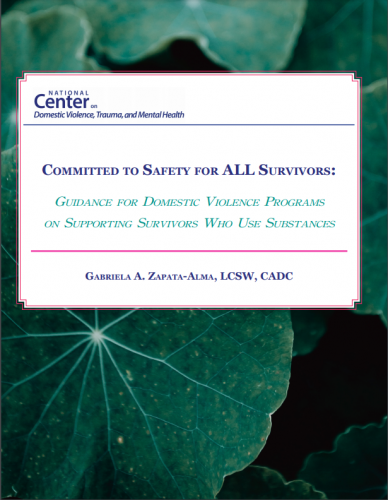Resources Library:
Start a Search:
Committed to Safety for ALL Survivors: Guidance for Domestic Violence Programs on Supporting Survivors Who Use Substances

Domestic and sexual violence can have significant effects on one’s health and mental health, including increased risk for substance use concerns. In addition to using substances in order to cope with experiences of violence, survivors of substance use coercion may also be coerced to use substances, face increased violence if they do not use substances, and have their attempts to engage in treatment and recovery sabotaged by an intimate partner or ex-partner. At the same time, many advocates feel unprepared to help survivors address concerns related to substance use and substance use coercion, resulting in increased barriers and risk of revictimization.
Committed to Safety for ALL Survivors assists programs and advocates in supporting survivors who use substances by providing practical strategies embedded within an accessible, culturally responsive, and trauma-informed (ACRTI) approach.
Download the guidance document below, or for additional resources, visit The National Center on Domestic Violence, Trauma, and Mental Health (NCDVTMH).
Community Action Toolkit for Addressing Intimate Partner Violence Against People of color
The National Coalition of Anti-Violence Programs research has shown that LGBTQ people of color are especially vulnerable to violence in intimate partner relationships. As LGBTQ people of color belong to multiple marginalized communities, it is even more di cult for these survivors to access services due to historical and institutional barriers along with personal and cultural challenges; where services do exist, they may not be culturally a rming and relevant to the lived experiences of LGBTQ communities of color.
Raising awareness and education about an issue is one of the fi rst steps to mobilizing and organizing communities to action. This toolkit was designed to provide our communities with strategies to create dialogue on intimate partner violence in communities of color, ways to support survivors, and identify resources for intimate partner violence.
Community Assessment Tool
This is an assessment tool to evaluate the policy and practice for effective process and enforcement of protective orders in a particular jurisdiction. This tool is intended to be utilized by coordinated community response teams to assess the local community response.
Community Assessment Tool - UPDATED
This is an assessment tool to evaluate the policy and practice for effective process and enforcement of protective orders in a particular jurisdiction. It is intended to be utilized by Coordinated Community Response Teams (CCRTs) to assess their local community response. Initially developed in 2008, the Tool has been revised to facilitate an assessment of your community’s efforts to improve the cultural responsiveness of services in your community—the ability to adapt services to meet the diverse needs of victims regardless of age, race/ethnicity, or other cultural identity. While the Tool was designed to address services around protective orders, it may also be helpful in fostering discussion in your community around other services for victims of sexual and domestic violence.
Comprehensive Human Trafficking Assessment
A trafficking assessment for frontline professionals to identify and assist potential victims of trafficking. This assessment is inclusive of both labor and sex trafficking.

